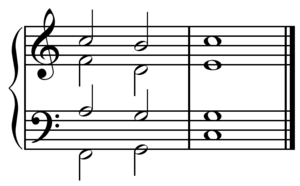Chord progression facts for kids
A chord progression is like a musical journey made of chords. Chords are groups of three or more musical notes played at the same time. When you play chords one after another, you create a chord progression.
These progressions are super important in Western music. They form the backbone of harmony, which is how different notes and chords sound good together. You'll find them in everything from old Classical music to modern pop and rock music. They are also key in traditional styles like blues and jazz.
Contents
How Chord Progressions Work
Think of a chord progression as the skeleton of a song. It gives the music its feeling and direction. When you hear a song, the chords are often changing. This change from one chord to the next is what makes the music flow.
The Circle of Fifths and Chords
Understanding the Circle of Fifths
The circle of fifths is a cool tool in music theory. It helps musicians understand how different keys and chords are related. Imagine a clock face, but instead of numbers, it has musical notes. Each note is a perfect fifth away from the next.
Using the Circle for Progressions
This circle is really helpful for chord progressions. For example, if a song uses the chords G, C, and D, you'll notice they are right next to each other on the circle of fifths. This makes them sound good together. If you want to play the same song in a different key, you can just pick three other chords that are next to each other on the circle. It's a simple way to change the key of a song!
Popular Chord Progressions
The Three-Chord Wonder
One of the most famous chord progressions uses the first, fourth, and fifth notes of a major scale. In the key of C, these notes are C, F, and G. So, the chords would be C major, F major, and G major.
This simple progression is used in tons of songs. Many songs that only use these three chords are called "three-chord songs." You can find them in many styles, including country, blues, rock, pop, and punk music. They are easy to learn and fun to play!
Related pages
Images for kids
-
The key note, or tonic, of a piece of music is called note number one, the first step of (here), the ascending scale iii–IV–V. Chords built on several scale degrees are numbered likewise. Thus the chord progression E minor–F–G can be described as three–four–five, (or iii–IV–V).
See also
 In Spanish: Progresión armónica para niños
In Spanish: Progresión armónica para niños
 | Anna J. Cooper |
 | Mary McLeod Bethune |
 | Lillie Mae Bradford |



